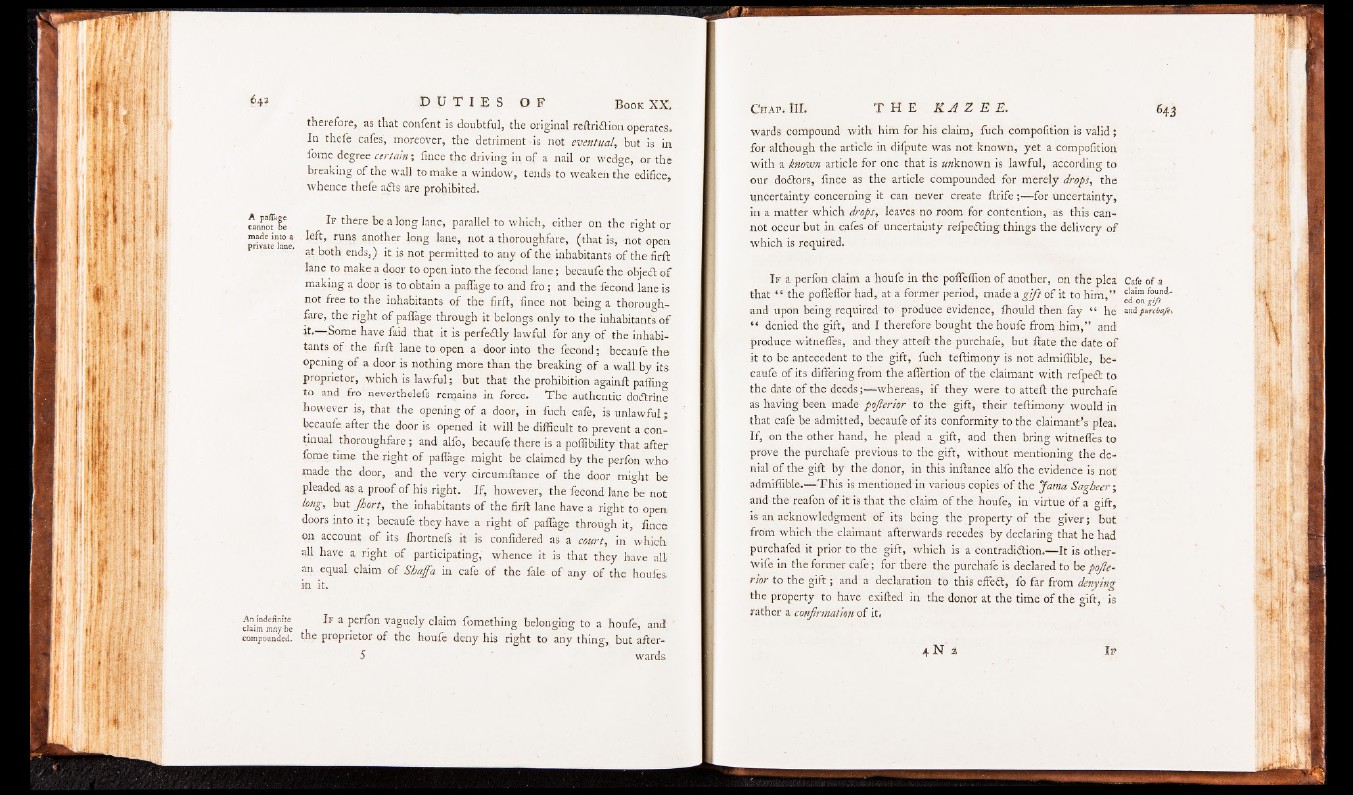
therefore, as that confent is doubtful, the original reftridtion operates.
In thefe cafes, moreover, the detriment'is not eventual, but is in
fome degree certain ; fince the driving ill of a nail or wedge,- .or the
breaking of the wall to make a window, tends to weaken the edifice,
whence thefe a fis are prohibited.
«nnof b' If there be a lonS lane> parallel to which, either on the right or
made inw a left, runs another long lane, not a thoroughfare, ("that is, 'not oDen
at both ends,; it is not permitted to any of the inhabitants of the firft
lane to make a door to open into the fécond lane ; becaufe the objed of
making a door is to obtain a paffage to and fro ; and the fécond lane is
not free to the inhabitants of the firfl, fince not being a thoroughfare,
the right of paffage through it belongs only to the inhabitants o f
it:— S;ome have faid that it is perfeflly lawful for any of the inhabitants
of the firfl: lane to open a door into the feçond ; becaufe the
opening of a door is nothing more than the breaking of a wall, by its
proprietor, which is lawful; but that the prohibition againfl paffino-
t ° and fro neverthelefs renjains in force. The authentic dodtrine
however is, that the opening of a door, in fuch 'cafe, is unlawful ;
becaufe after the door is opened it will be difficult to prevent a continual
thoroughfare; and alfo, becaufe there is a poffibility that after
fome time the right of paflàge might be claimed by the perfon who.
Wade the door, and the very circumftance of the door mi°ht be
pleaded as a proof of his right. If, however, the fécond lane be not
long, but Jhort, the inhabitants of the firfl lane have a right to open
doors into it ; becaufe they have a right of paflàge through it, fince
on account of its ffiortnefs it is confidered as a court, in which
all have a right of, participating, whence it is that they have all
an equal claim of Sbaffa in cafe of the fale of any of the houfes
in it.
If a perfon vaguely claim fomething belonging to a houfe, and
the proprietor of the houfe deny his right to any thing, but after-
5 ‘ wards
An indefinite
claim may be
compcmnded.
wards compound with him for his claim, fuch compofition is valid ;
for although the article in difpute was not known, yet a compofition.
with a known article for one that is ««known is lawful, according to
our doctors, fince as the article compounded for merely drops, the
uncertainty concerning it can never create ftrife ;— for uncertainty,
in a matter which drops, leaves no room for contention, as this cannot
occur but in cafes of uncertainty refpedling things the delivery of
which is required.
If a perfon claim a houfe in the poffeffion of another, on the plea Cafe of a
that “ the pofleffor had, at a former period, made a gift of it to him,”
and upon being required to produce evidence, ffiould then fay “ he and purcbqft,
“ denied the gift, and I therefore bought the houfe from.him,” and
produce witneffes, and they attefl: the purchafe, but Hate the date of
it to be antecedent to the gift, fuch teftimony is not admiffible; becaufe
of its differing from the aflertion of the claimant with refpedt to
the date of the deeds;~whereas* if they were to attefl: the purchafe
as having been made pofierior to the gift, their teftimony would in
that cafe be admitted, becaufe of its conformity to the claimant’s plea.
If, on the other hand, he plead a gift, and then bring witneffes to
prove the purchafe previous to the gift, without mentioning the denial
of the gift by the donor, in this inftance alfo the evidence is not
admiffible.— This is mentioned in various copies of the Jama Sagheer;
and the reafon of it is that the claim of the houfe, in virtue of a <nft,
is an acknowledgment of. its being the'property of the giver; but '
from which the claimant afterwards recedes by declaring that he had
purchafed it prior to the gift, which is a contradidlion,— It is other-
wife in the former cafe; for there the purchafe is declared to be pofie-
rior to the g ift; and a declaration to this effedl, fo far from denying
the property to have exifted in the donor at the time of the gift, is
rather a confirmation of it.
4 N i I f